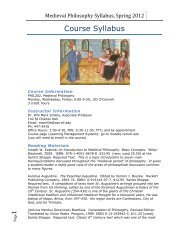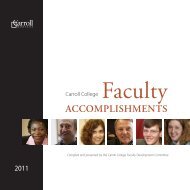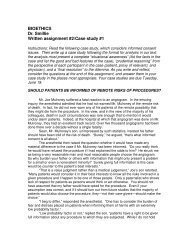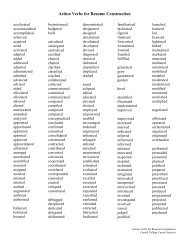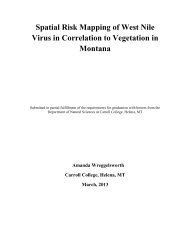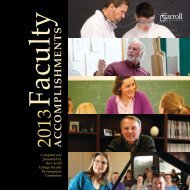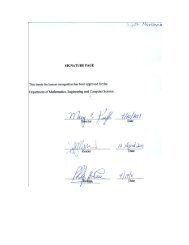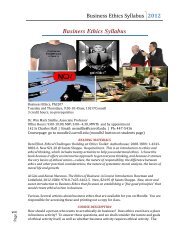How to Help Your Students Get the Most Out the MCM and ICM
How to Help Your Students Get the Most Out the MCM and ICM
How to Help Your Students Get the Most Out the MCM and ICM
You also want an ePaper? Increase the reach of your titles
YUMPU automatically turns print PDFs into web optimized ePapers that Google loves.
FOCUS August/September 2006<br />
<strong>How</strong> <strong>to</strong> <strong>Help</strong> <strong>Your</strong> <strong>Students</strong> <strong>Get</strong> <strong>the</strong> <strong>Most</strong> <strong>Out</strong> <strong>the</strong> <strong>MCM</strong> <strong>and</strong> <strong>ICM</strong><br />
By Holly Zullo, Mark Parker, <strong>and</strong> Kelly Cline<br />
Each February <strong>the</strong> Consortium for<br />
Ma<strong>the</strong>matics <strong>and</strong> Its Applications (CO-<br />
MAP) coordinates <strong>the</strong> Ma<strong>the</strong>matical<br />
Contest in Modeling (<strong>MCM</strong>) <strong>and</strong> <strong>the</strong><br />
Interdisciplinary Contest in Modeling<br />
(<strong>ICM</strong>). <strong>Students</strong> from around <strong>the</strong> world<br />
compete at <strong>the</strong>ir home institutions in<br />
teams of three, working on an openended<br />
applied ma<strong>the</strong>matics problem. The<br />
problems are big, messy, <strong>and</strong> not at all<br />
like a homework problem; instead, <strong>the</strong>y<br />
resemble an applied research problem.<br />
Past problems have included estimating<br />
<strong>the</strong> global effects of a large meteor<br />
impacting Antarctica, studying dinosaur<br />
hunting strategies, <strong>and</strong> developing methods<br />
for detecting submarines in <strong>the</strong> ocean.<br />
In o<strong>the</strong>r words, <strong>the</strong> students spend 96<br />
hours working on a problem that is unlike<br />
anything <strong>the</strong>y have ever seen before.<br />
<strong>Most</strong> students have great fun with <strong>the</strong><br />
contest <strong>and</strong> learn a lot of math. Best of<br />
all, it can be a really inspiring experience.<br />
The contest gives <strong>the</strong>m a chance <strong>to</strong> test<br />
����������������������������������������<br />
problem with no faculty training wheels<br />
<strong>to</strong> help when <strong>the</strong>y get stuck, giving <strong>the</strong>m<br />
a taste of what it is like <strong>to</strong> use ma<strong>the</strong>matics<br />
in a real-world situation. The modeling<br />
contest has become one of <strong>the</strong> high<br />
points of <strong>the</strong> year for our department,<br />
luring more students <strong>to</strong> pursue majors<br />
<strong>and</strong> minors in ma<strong>the</strong>matics.<br />
<strong>How</strong>ever, if you want this <strong>to</strong> happen, you<br />
�����������������������������������������<br />
<strong>and</strong> throw <strong>the</strong>m in <strong>the</strong> deep end, hoping<br />
that things will turn out well 96 hours<br />
later. <strong>Your</strong> students will be much more<br />
successful if you can provide support<br />
by helping <strong>the</strong>m form teams, running<br />
practice sessions prior <strong>to</strong> <strong>the</strong> contest,<br />
<strong>and</strong> <strong>the</strong>n making sure <strong>the</strong>y have what<br />
<strong>the</strong>y need during <strong>the</strong> contest. We provide<br />
each team with a room of <strong>the</strong>ir own on<br />
campus (an NP-hard task considering that<br />
<strong>the</strong> contest runs through both a Friday<br />
<strong>and</strong> a Monday). We make sure that <strong>the</strong>y<br />
have computers <strong>and</strong> internet access. We<br />
even provide food, munchies, <strong>and</strong> caffeine<br />
<strong>to</strong> help fuel <strong>the</strong>m through those<br />
late nights.<br />
22<br />
�����������������������������������������������������������������������������st<strong>and</strong>ing<br />
<strong>MCM</strong> Team at Work.<br />
The pre-contest practice sessions are<br />
particularly helpful in arming our students<br />
with <strong>the</strong> skills <strong>the</strong>y need in order<br />
<strong>to</strong> make sure that this contest is a fabulous<br />
learning experience instead of an<br />
overwhelming disaster. Teams need <strong>to</strong><br />
be formed early <strong>and</strong> meet regularly for<br />
practice. We try <strong>to</strong> form our teams in<br />
early November <strong>and</strong> get practice sessions<br />
going immediately. We generally have<br />
���� ���������� ����� ���� �������� ������<br />
two hours. But what should we do with<br />
our ten hours of practice time? First we<br />
need <strong>to</strong> recognize what skills are needed<br />
for this contest. We break <strong>the</strong>se skills<br />
in<strong>to</strong> three categories: communication,<br />
problem solving, <strong>and</strong> writing.<br />
Communication<br />
Although students may have experience<br />
working on group projects, it is likely<br />
that <strong>the</strong>re is nothing in <strong>the</strong>ir backgrounds<br />
that has come close <strong>to</strong> preparing <strong>the</strong>m<br />
<strong>to</strong> work with two o<strong>the</strong>r people on one<br />
project for 96 straight hours. They need<br />
����������������������������������������<br />
ideas receive proper consideration, how<br />
<strong>to</strong> keep everyone busy with a valuable<br />
�������������������������������������������<br />
will inevitably arise. Last year we invited<br />
a faculty member from Communications<br />
<strong>to</strong> meet with our students <strong>and</strong> work with<br />
<strong>the</strong>m on small group communication<br />
skills. We found that during <strong>the</strong> contest<br />
weekend students were much more aware<br />
of <strong>the</strong> need for communication, <strong>and</strong> <strong>the</strong>y<br />
were actively practicing <strong>the</strong> skills <strong>the</strong>y<br />
had been taught.<br />
One dangerous pitfall that many teams<br />
face is that when a disagreement comes<br />
up, <strong>the</strong>y vote, two students on one side,<br />
one student on <strong>the</strong> o<strong>the</strong>r, <strong>the</strong> majority<br />
rules <strong>and</strong> <strong>the</strong> thoughts of <strong>the</strong> third student<br />
are ignored. Several times we have seen<br />
a team member frozen out who <strong>the</strong>n feels<br />
disenfranchised <strong>and</strong> left out. Instead,<br />
students need <strong>to</strong> be <strong>to</strong>ld right from <strong>the</strong><br />
beginning that voting is off <strong>the</strong> table,<br />
<strong>and</strong> that all decisions need <strong>to</strong> be made<br />
��� ���������� ��� ���� ��� ����� ��� �������� ��<br />
2–1 split <strong>the</strong>n <strong>the</strong>y need <strong>to</strong> sit down <strong>and</strong><br />
talk things through, <strong>and</strong> <strong>the</strong> two need <strong>to</strong><br />
listen very carefully <strong>to</strong> <strong>the</strong> thoughts of<br />
<strong>the</strong>ir teammate, <strong>to</strong> underst<strong>and</strong> where he<br />
����������������������������������������<br />
what <strong>the</strong>y are not seeing.
August/September 2006<br />
�������������������������������������������<br />
<strong>to</strong> spend time listening very carefully <strong>to</strong><br />
all of <strong>the</strong>ir teammates. The most talkative<br />
person usually ends up being <strong>the</strong><br />
team leader, <strong>and</strong> more quiet students are<br />
ignored. <strong>How</strong>ever, being talkative has<br />
little <strong>to</strong> do with intelligence, <strong>and</strong> some<br />
very smart people are quiet <strong>and</strong> perhaps<br />
shy. <strong>Students</strong> need <strong>to</strong> listen, <strong>to</strong> make<br />
sure that everyone is participating, <strong>and</strong><br />
����������������������������������������<br />
������������������������������������������<br />
�������������������<br />
Problem Solving<br />
<strong>MCM</strong> problems are big, <strong>and</strong> <strong>the</strong> students<br />
need help managing problems of this<br />
magnitude. They need <strong>to</strong> learn a modeling<br />
process where <strong>the</strong>y take a large<br />
problem, make simplifying assumptions<br />
<strong>to</strong> develop an initial model, <strong>and</strong> <strong>the</strong>n relax<br />
assumptions <strong>to</strong> develop more realistic<br />
models as time permits.<br />
We use about half of each practice session<br />
<strong>to</strong> have our teams carefully look at past<br />
problems. Our st<strong>and</strong>ard exercise has been<br />
<strong>to</strong> h<strong>and</strong> out a problem from a previous<br />
year <strong>and</strong> have each team read <strong>the</strong> problem<br />
statement carefully, brains<strong>to</strong>rm ideas, <strong>and</strong><br />
<strong>the</strong>n outline <strong>the</strong>ir solution strategy. This<br />
can be very useful, because it gives <strong>the</strong><br />
students a sense of what <strong>to</strong> expect, as well<br />
as a little practice in how <strong>to</strong> get started.<br />
<strong>How</strong>ever, <strong>the</strong>se sessions often result in<br />
a laundry list of minutiae that could be<br />
important <strong>to</strong> <strong>the</strong> problem, without settling<br />
on any particular starting point.<br />
To avoid this trap, we now send students<br />
����������������������������������������<br />
a very simple model for <strong>the</strong> situation.<br />
Ra<strong>the</strong>r than w<strong>and</strong>ering around all <strong>the</strong><br />
possible complications of a problem, we<br />
want <strong>the</strong>m <strong>to</strong> focus on <strong>the</strong> bare minimum<br />
details <strong>and</strong> simplifying assumptions.<br />
Once <strong>the</strong>y have a very simple model,<br />
<strong>the</strong>y can decide what complicating fac<strong>to</strong>r<br />
would be added next.<br />
Last year, we gave students <strong>the</strong> Coal<br />
Tipple Problem (<strong>MCM</strong> Problem B,<br />
1993). In this problem, students are asked<br />
<strong>to</strong> analyze <strong>the</strong> operation of a coal tipple<br />
which is used <strong>to</strong> load coal trains. Three<br />
trains arrive s<strong>to</strong>chastically throughout<br />
each day, with a high capacity train arriving<br />
on Thursdays, <strong>and</strong> <strong>the</strong> students<br />
are given <strong>the</strong> details about how much<br />
coal <strong>the</strong> tipple can hold, how much time<br />
it takes <strong>to</strong> <strong>the</strong> load <strong>the</strong> tipple, how much<br />
<strong>the</strong> trains can hold, <strong>and</strong> <strong>the</strong> relevant costs<br />
involved.<br />
The students must determine <strong>the</strong> number<br />
of crews <strong>to</strong> have on duty <strong>to</strong> load <strong>the</strong> tipple<br />
<strong>and</strong> <strong>the</strong> average monthly costs. Last year,<br />
after 30 minutes of brains<strong>to</strong>rming <strong>and</strong><br />
work, our students developed initial models<br />
that assumed all days were equivalent<br />
<strong>and</strong> that <strong>the</strong> three train arrivals were deterministic<br />
<strong>and</strong> evenly spaced throughout<br />
<strong>the</strong> work day. Next, <strong>the</strong> teams planned<br />
<strong>to</strong> incorporate some form of probability<br />
distribution in<strong>to</strong> <strong>the</strong>ir models <strong>and</strong> account<br />
for <strong>the</strong> non-homogeneity of <strong>the</strong> work<br />
days. This exercise of creating a minimal<br />
model seemed <strong>to</strong> help <strong>the</strong> students<br />
quickly get started during <strong>the</strong> contest.<br />
Writing<br />
The end result of this contest is a written<br />
paper that is submitted for judging.<br />
<strong>Students</strong> tend <strong>to</strong> greatly underestimate <strong>the</strong><br />
time necessary <strong>to</strong> prepare this paper, <strong>and</strong><br />
�������������������������������������<br />
<strong>to</strong> writing as a group. Often a team will<br />
do some really good ma<strong>the</strong>matics, but<br />
not put nearly enough time in<strong>to</strong> writing<br />
<strong>the</strong> paper, resulting in something barely<br />
coherent. Also, <strong>the</strong> writing should be as<br />
collaborative as possible, <strong>and</strong> every team<br />
member should read <strong>and</strong> try <strong>to</strong> improve<br />
every word in <strong>the</strong> paper. A team that divides<br />
up <strong>the</strong> sections of <strong>the</strong> paper <strong>and</strong> <strong>the</strong>n<br />
blindly combines <strong>the</strong>m <strong>to</strong>ge<strong>the</strong>r at <strong>the</strong> end<br />
will rarely turn in a lucid document.<br />
It is not easy <strong>to</strong> convince <strong>the</strong> students <strong>to</strong><br />
set aside enough time for <strong>the</strong> writing part<br />
of <strong>the</strong> contest. We can talk at <strong>the</strong>m all we<br />
want about writing, but in <strong>the</strong> end <strong>the</strong>y<br />
�������������������������������������������<br />
point. To provide <strong>the</strong>m this experience,<br />
we give <strong>the</strong> students a simple optimiza-<br />
�������������������������������������lus,<br />
<strong>and</strong> we ask <strong>the</strong>m <strong>to</strong> solve <strong>the</strong> problem<br />
<strong>and</strong> write a paragraph or two describing<br />
FOCUS<br />
<strong>the</strong>ir solution process. Although <strong>the</strong>y are<br />
���������������������������������������<br />
minutes, most have trouble completing<br />
<strong>the</strong> writing in <strong>the</strong> allotted 30 minutes.<br />
They learn a lot about how <strong>to</strong> write as<br />
a team, but even more importantly, <strong>the</strong>y<br />
learn how long it takes <strong>to</strong> write about<br />
even a small amount of work. We always<br />
encourage students <strong>to</strong> begin writing<br />
almost immediately during <strong>the</strong> contest,<br />
<strong>and</strong> <strong>to</strong> cease all work shortly after <strong>the</strong><br />
halfway point <strong>and</strong> devote all <strong>the</strong>ir energy<br />
<strong>to</strong> writing up <strong>the</strong>ir results.<br />
The <strong>MCM</strong> provides a great opportunity<br />
for students <strong>to</strong> challenge <strong>the</strong>ir skills in<br />
ma<strong>the</strong>matics, teamwork, <strong>and</strong> ma<strong>the</strong>matical<br />
writing. They will get <strong>the</strong> most out<br />
of this opportunity if <strong>the</strong>y have some<br />
preparation <strong>and</strong> advance practice with<br />
<strong>the</strong>ir teams. In <strong>the</strong> end, whatever <strong>the</strong>ir<br />
rankings are, we want <strong>the</strong> students <strong>to</strong> feel<br />
���������������������������������������<br />
<strong>the</strong> weekend, <strong>and</strong> <strong>to</strong> come away more excited<br />
about <strong>the</strong> power of ma<strong>the</strong>matics.<br />
For more information on <strong>the</strong> <strong>MCM</strong>/<strong>ICM</strong>,<br />
see http://www.comap.org. For more<br />
information about <strong>the</strong> <strong>MCM</strong>/<strong>ICM</strong> at<br />
Carroll College <strong>and</strong> our preparation, see<br />
http://www.carroll.edu/~mparker/mcm.<br />
html.<br />
Holly Zullo, Mark Parker, <strong>and</strong> Kelly<br />
Cline teach at Carroll College in Helena,<br />
Montana <strong>and</strong> have been involved in <strong>the</strong><br />
Modeling Contest for <strong>the</strong> past eleven<br />
years.<br />
The COMAP Undergraduate<br />
Modeling Contests<br />
The Ma<strong>the</strong>matical Contest in Modeling<br />
(<strong>MCM</strong>) challenges teams of students<br />
<strong>to</strong> clarify, analyze, <strong>and</strong> propose<br />
solutions <strong>to</strong> open-ended problems. The<br />
contest attracts diverse students <strong>and</strong> faculty<br />
advisors from over 500 institutions<br />
around <strong>the</strong> world.<br />
The Interdisciplinary Contest in<br />
Modeling (<strong>ICM</strong>) is an extension of<br />
<strong>the</strong> Ma<strong>the</strong>matical Contest in Modeling<br />
(<strong>MCM</strong>) designed <strong>to</strong> develop <strong>and</strong> advance<br />
interdisciplinary problem-solving<br />
skills as well as competence in written<br />
communication<br />
23



